The Farming Family: Work, Character, and Change in Rural America
From: University of Michigan | By: Tom Fricke
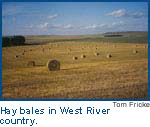 The scene is iconic for most Americans, whether or not they've felt the scratch of straw under their collars at haying season or busted a combine's header against a fieldstone at harvest. It's late April. At about 5:00 a.m., when there's just a hint of glow on the eastern horizon, you begin to hear the movement in the house. Somebody gets up from the master bedroom, its door just off the kitchen, to get the coffee started. If it's Joe, he'll walk from there to the study at the front of the house and glance at the satellite feed for the day's weather and the current futures market in wheat. If it's Marie, she'll be getting into the bathroom before things get crowded. Upstairs, their 18-year-old son will squeeze out as many more minutes of sleep as he can because he may have been out with friends after the day's chores ended at 10:00 the evening before. His sister's room has been empty since she went away to Minneapolis.
The scene is iconic for most Americans, whether or not they've felt the scratch of straw under their collars at haying season or busted a combine's header against a fieldstone at harvest. It's late April. At about 5:00 a.m., when there's just a hint of glow on the eastern horizon, you begin to hear the movement in the house. Somebody gets up from the master bedroom, its door just off the kitchen, to get the coffee started. If it's Joe, he'll walk from there to the study at the front of the house and glance at the satellite feed for the day's weather and the current futures market in wheat. If it's Marie, she'll be getting into the bathroom before things get crowded. Upstairs, their 18-year-old son will squeeze out as many more minutes of sleep as he can because he may have been out with friends after the day's chores ended at 10:00 the evening before. His sister's room has been empty since she went away to Minneapolis.
Other than the coffee, you're on your own for breakfast unless Marie feels like slicing some fruit or there's some leftover pastries. The important preparation for food is filling the Igloo coolers that go out to the field with every person on the crew — four sandwiches, bags of potato chips, candy bars, a cold can of pop, carrots and celery, and an apple.
By about 5:30, Joe is sitting by the counter or at the nearby dining room table. He may be talking school board business on the phone that has already begun its ringing. Marie is behind the counter setting up the Igloos or working through accounts. The neighboring farmer from just over the hill to the south, a distant cousin, has walked in without ceremony and is leaning against the wall by the refrigerator with a thermal mug of coffee in his hand. For the last few years, Joe and his neighbor, Craig, have swapped labor at seeding and harvest. Craig owns a sprayer, and Joe's tractor and seeding rig covers ground much more quickly than Craig's equipment.
Craig will give a yell up to Duane at about 5:45 and the thud of feet overhead guarantees his speedy arrival to the kitchen tableau. Joe, back in the corner by the window leaning his chair, runs through imagined hours as though the day can't happen without his nudge. Before long, he'll start drumming his fingers on the counter. He'll nod his head as decision brings his chair to the floor. For him, the day begins like the sudden bolt of a big cat.
"Duane, you go out and feed the cattle. When you go into town, see if they have that part over at the store and give me a call. When you get back, we'll be out at.... Marie, you need to... Craig, you head over to...."
So the day begins in the farming and ranching country just north of West River, North Dakota. By its end, the different actors will converge and separate as the choreography of their separate tasks animates the logic of feeding cattle, seeding new grain, refilling tanks and bins, and taking short breaks in fields as close as the house and as far as the next county.
Farming as an American symbol
Although fewer than 2 percent of Americans are engaged in farming these days, most people feel a connection beyond experience to this opening scene. The family farm signifies a core myth of who we are. From the Jeffersonian image of a democratic republic resting on its landed and independent citizenry to more current images linking the good life, a living work ethic, and strong family values to the countryside, farming has long held an especially virtuous place in the American imagination. The rural acts as our contemporary icon of the past.
Much of this image has to do with the connections among work, character and family. We understand farm life as the last redoubt of the integrated family economy before the rise of factories and capitalist production. Even when the story is less than idyllic, we nevertheless hold farmers up as an idealized contrast to the sense that something is missing in our own "modern" temperament. Like any symbol, our vision of the American farm family can be put to many uses. In doing so, we also run the risk of simplifying a complex reality.
Today's farmers are as subject to the conditions of globalized markets as any other worker. Joe's satellite feed is one indication of this. Despite the family economy of husband, wife, son and cousin, he tracks the potential impact of American grain sales to Pakistan and the long-term probability of drought in grain-producing regions of Texas or Argentina as closely as any producer eyes the competition or the extension of favored trading status to China.
The paradox of farming, and its relevance to understanding the acceleration of changes in work and family in contemporary American life, is precisely that its symbolic role in our cultural imagination more explicitly acknowledges its interweaving of work, family and character. Both Joe and Craig see farming as a partnership that involves the commitment of their wives and families. It requires an array of skills to be done right and instills a special set of virtues in their children. At the same time, it connects them to global relations that encumber the free exercise of this spirit.
Farming as a way of life is based on explicit assumptions about idealized family relationships, gendered categories and work. These are themselves the avenues that link the domestic and the public worlds. The countervailing myth of the American Middle Class family has, on the other hand, pretended to a separation of these same domains. As recent scholarly attention shifts to the dynamic relationship that has always characterized these intersections among the majority of Americans, a reconsideration of this powerful symbol places us on firmer comparative ground.
Studying West River
I came to West River as an anthropologist interested in how the culture of work and family gets shaped by a place and its history. I was interested, too, in how changes in work and career choices might affect relations between those who stay and those who leave. My work concentrates on how enculturation in a rural world, with all its implications for how family and work are defined, will structure the responses of people to contemporary American work and family changes.
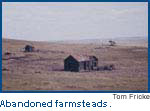 West River's history is mostly a history of leaving. To attract immigrants in the last century, it advertised its "excellent farming and grazing lands all around, healthy climate, congenial people, fresh air and sunshine." People came, mostly German Catholics, and settled the land in 160- and 320-acre chunks. The town grew, but never much. By 1970, it began its steady population decline after edging up to its census peak of 799. Its 1990 population was 625. Of the high school graduating classes from 1973-1975, only a quarter still live in West River or on its neighboring farms. Responding to an essay question from the high school principal last year, only three out of twenty-five graduating seniors thought they would be living in the area five years from now.
West River's history is mostly a history of leaving. To attract immigrants in the last century, it advertised its "excellent farming and grazing lands all around, healthy climate, congenial people, fresh air and sunshine." People came, mostly German Catholics, and settled the land in 160- and 320-acre chunks. The town grew, but never much. By 1970, it began its steady population decline after edging up to its census peak of 799. Its 1990 population was 625. Of the high school graduating classes from 1973-1975, only a quarter still live in West River or on its neighboring farms. Responding to an essay question from the high school principal last year, only three out of twenty-five graduating seniors thought they would be living in the area five years from now.
An approach to farming as a way of life requires acknowledgment of these changes. It directs us to specific questions. How do work and family play out as key symbols and themes of farming world? How is character shaped by context? How do farming families prepare their children for the certainty of a changed future?
Farming as a way of life
When we finished seeding one of his fields late at night, alone on a hillside that once hummed with the shared labor and banter of six crews, Joe and I stood under the stars talking about the thinning out of the countryside. We were quiet for a while taking in the chill and the damp, when he turned to me and spoke as if for all farmers, "I know what we're doing is right. And I know the Lord made me for this. I just want to do it right is all." Joe's statement fills the criteria for work as calling by linking it to character. It also widens toward a whole culture of relationships, a way of life where the virtues of family and work are apparent to all.
These wider commitments introduce an embattled and contentious note to West River. The extent to which doing right is limited to the direct tasks of farming or to a wider universe of being are sources of a dispute that runs along generational lines in West River. The problem as people see it is that outside influences are making their way into West River.
Everybody agrees that farming has changed since the time of Joe's parents. But it's the older generation that's most likely to see the link between the business and production sides in farming and the decline in character. One farmer was emphatic about farming requiring a whole bundle of commitments that include a willingness to "go without the luxuries." The problem, as he saw it, was that "nowadays they have to have everything" from vacations to material goods like TV, carpeting and air conditioning.
Even those younger farmers who might quibble about what counts as luxury regard themselves as having no less a commitment to a way of life distinguished from that of wage and salary workers in towns and cities. Growing up, Joe's reference point turned around the neighboring farms; today it's the whole United States. Although Joe and Marie live in a house with carpeting, have a fairly large color TV, and a window air conditioner that they set up every summer, they are as adamant as Joe's father that farming confers a special character on its practitioners. Throughout the area, parents of Joe's generation say that a compelling reason they remained behind when so many have left is that their children will profit by being raised here. And even those who treat farming as a job, as a way to make a living, emphasize that in spite of the low pay, they can't imagine working for wages to another person's schedule.
The elements of a way of life go beyond a single set of technical skills. Farming is notorious for its variety of tasks, some sequenced by season and others that fit into the gaps between more time-laden jobs. West River's high school secretary, who grew up on a farm and continues to work with her husband in addition to her salaried work, spoke about that punctuated variety with pleasure. The pieces that go into constructing a way of life include a set of ideas that link behavior, relationships, and internal virtues. In West River, people speak of these in terms of work, family, and the character defined by having a work ethic. These ingredients exist within a shared context that we can think of as a family farm culture. They depict internally necessary orientations within West River.
Work
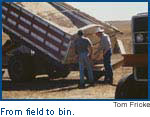
Regardless of age or gender, the people I talked with rooted things in work. "I think work — for me, for anybody — work is life," as one man put it. These sentiments become physical in the posture of West River people at rest, evident on Sundays and Holy Days of Obligation when the farming population takes enforced respite from action at the Abbey Church that dominates the town. Men, especially, sit uncomfortably immobile during the Mass, their big hands held open as if in need of a wrench. At such moments, the Catholic practice of frequent rising, sitting and kneeling appears to be a blessing.
There's no need to look far for the origins of this strong feeling about work. Every person I spoke with in West River talked about its importance in setting the character of their lives. Whether they grew up in town or on the farm, nearly every person had the experience of farm work because of the overlapping kin and labor-sharing networks that tied townspeople to farm relatives. It's easy to see that most people grew up in a world that lacked room for idleness and the comments of older people are hard to distinguish from those in Joe's generation.
Craig's wife Renae, a notably independent and competent member of the community, wakes up every day at 4:30 to have quiet time to get work done and think by herself. She reflected, "When your parents told you this is something you have to do, then this is what you do because if you don't do it then the rest doesn't function. Everything that happens there is important in one way or another." Her comment suggests how the emphasis on hard work goes beyond its self-evident value to include an economy of relations.
The working family
Although it took city scholars a longer while to recognize the family nature of farm work and the central role women play in the farm economy, West River farmers are quick to point to the collective nature of the enterprise. Speaking of his wife, Craig said, "Oh, God. If one of us wanted to quit it would be done. There's no way you could stay. You see that time and time again. As soon as one of the two doesn't want to do it anymore the place either falls apart, or there's a divorce or they just up and leave, they're just done. Because you can't do it alone. It's a partnership."
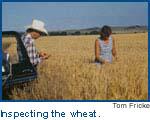
Joe's vision of the partnership of work and relationship is similarly expressed, but he links it directly to the quality of their family relationship, too, by contrasting their current relationship with the way it was when his wife worked at a community bank. With the banking, he said, "It was so private that we didn't have a relationship through her job, where here we consult and talk about everything we do." Marie follows up by emphasizing the inseparability of family and work. "When you're living this life it's a family thing, plus the work thing has to go together or it doesn't work. "
Marie and Joe's comments point to the heavy reliance of the family farm way of life on gendered divisions of labor. As adept at the work of driving trucks and tractors, feeding cattle, and handling the calving as Marie and Renae are, they take these tasks on as additions to their other responsibilities within the household. Both of them bake for their families. Both of them handle the bookwork. Both of them also handle the emotional economy of the family enterprise. It's Marie who makes regular visits to Joe's grandmother at the hospital in West River, who surprises Joe on his birthday with a few days off a grueling schedule in a rented cabin in the Badlands, who is alert to the needs of smoothing family tensions.
The work ethic
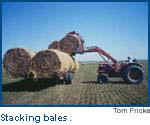
When farmers drive the section line roads and highways of West River, their eyes scan the landscape the way most people read a newspaper. Nothing is more revealing of a person's flaws than the quality of his fields. A sloppy field is a headline announcing a sloppy character. Reading fields after seeding, Joe would joke about a missed row or a plugged line in the air seeder in those holes where black earth pooled like oil in an otherwise green field. There's no stealth to farming, no covering your tracks, where every crooked line and every gap with a sprayer gets inscribed for later reflection and casual commentary. This is one of the reasons that Joe will experiment with unfamiliar crops in a back quarter bordering little used roads.
This concrete relationship between character and work encourages a special emphasis on what West River people see as the presence of a work ethic. The classic American notion of the work ethic, linked to the Protestant and upper class virtues of hard work for self and community, is probably overdone as the unique property of a single class or culture. West River residents clearly speak of it in terms that connote the original spiritual goods that redound to individual and community.
On the one hand, the work ethic is a latent quality of character that will express itself as an internal virtue made public by action. On the other, it has to do with relationships between people that connote unstated obligations of quality. Both of these share a common sense of something internal made concrete in action — in short a connection between character and work.
Socializing for the unknown
When Joe and Craig were growing up, it was more or less assumed that some of the kids would stay to take over the farm. Working in the family economy was an unstated apprenticeship for a way of life. Contemporary life makes that a far less certain prospect. It isn't just West River that's losing people. The entire county loses population with every census. Farms grow bigger as the population thins. School districts consolidate. Businesses close. Joe watches quietly as yet another farmer shuts down and leaves the land and wonders, "Will I be next?"
Today, parents are compelled toward a more consciously planned upbringing for their children. Where Joe and Marie never went to college, they make a point of encouraging their own son and daughter to attend. Joe and Marie tried hard to get their son to go to a college further from home, but compromised on his choice to stay near West River, happy that he was giving it a try at all.
In the changing world of West River, farming gets viewed as an advantaged preparation for a probable life away. Growing up on a farm becomes valuable for the virtues of realism, practicality, and internal character that it instills.
This new world of preparation has its continuities with the way of life in West River, but the focus is on internal qualities that are not necessarily shared by others. Nor will character be so easily reflected in the concrete ways that West River fields can reveal to the attuned eye. Where all farmers share the same modes of work and are better or worse at it, those who leave West River will pursue different careers and will live in a more varied context.